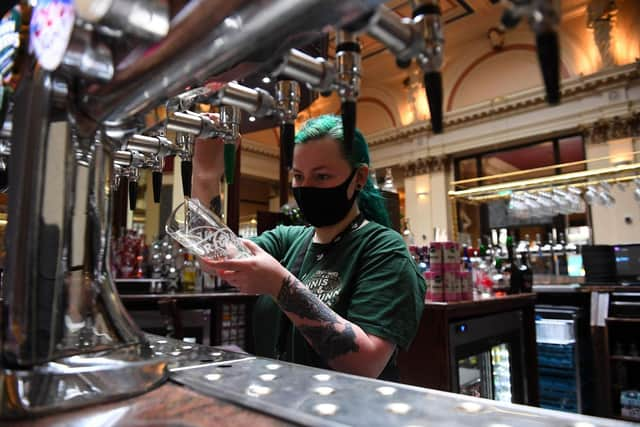Covid Scotland: Hospitality industry calls for ongoing tax breaks to deliver 'booster' for businesses
Ms Forbes has promised this week’s Scottish Budget will serve as a “stepping stone towards a fairer, greener” nation.
She will reveal her draft tax and spending plans for 2022/23 in a statement to Holyrood on Thursday.
Advertisement
Hide AdAdvertisement
Hide AdFirst Minister Nicola Sturgeon has already confirmed this will include cash to double the Scottish Child Payment, which helps youngsters in poorer families, from £10 a week to £20 a week from April – a move widely welcomed by anti-poverty campaigners.


Ms Forbes said the Budget this year would be “set against a challenging fiscal backdrop as a result of the UK Government’s decision to reduce Scotland’s day-to-day spending by removing ongoing Covid funding, despite the continuing impacts of the pandemic”.
The UK Government, however, insists that it is providing record amounts of cash to Holyrood.
In his Budget statement in October, Chancellor Rishi Sunak claimed the Scottish Government was in line to receive £41 billion a year from Westminster.
However, Scottish ministers argue that when additional spending over the past two years to help cope with Covid is included, the amount they will have at their disposal will fall in 2022/23.
Despite this, Ms Forbes pledged: “The Budget I will present on Thursday will enable the Scottish Government to make good on our promise to build a fairer, greener Scotland. That is our social, economic and environmental imperative.”
It comes at what she described as a “critical time for Scotland”, with the finance secretary noting: “We are still in the grip of the pandemic and families and businesses across the country are bearing the brunt of the cost of living crisis.
“However, in these times of crisis, we need to go beyond the norm.
Advertisement
Hide AdAdvertisement
Hide Ad“While the pandemic may have defined our lives in recent times, the Scottish Government is determined it does not define our future.”
Stephen Montgomery, of the Scottish Hospitality Group (SHG), said both the potential return of business rates in April and the planned increase in the national living wage to £9.50 were a source of financial pressure.
Retail, hospitality, leisure and aviation businesses were all given 100 per cent rates relief in the current financial year.
Mr Montgomery wants this extended by a further year, followed by a "cautious and phased reduction in relief over subsequent financial years once hospitality businesses have stabilised".
He said: "Hospitality in Scotland is key to everything.
"You can have as many castles and glens and mountains as you want, and lovely rivers with salmon fishing, but unless you've got the pubs and restaurants – it doesn't make up tourism, does it?"
The SHG has called for a range of measures, including initiatives to address ongoing recruitment problems.
Dr Liz Cameron, chief executive of the Scottish Chambers of Commerce, called for a Budget that "prioritises economic recovery, slashes upfront business costs and creates an environment that keeps Scotland’s businesses competitive".
She said: “Business rates remain the biggest burden for businesses across Scotland and we hope to see the Cabinet secretary for finance and the economy finally confirm that the non-domestic rates revaluation that is due to take place in 2023 will go ahead as planned and consideration is given to extending the current Covid-19 reliefs afforded to properties in the retail, leisure and hospitality sectors into the 2022/23 financial year.”
Advertisement
Hide AdAdvertisement
Hide AdMeanwhile, retail leaders have suggested temporarily slashing parking charges and fares on public transport to entice shoppers back to city centres.
David Lonsdale, director of the Scottish Retail Consortium, said a return to full business rates would be "insurmountable" for many struggling shops.
He said: “Retail sales and shopper footfall in Scotland have buckled during Covid and even now, seven months after lockdown ended, remain well below pre-pandemic levels.
"The number of vacant units has shot up, with one in every six shops lying empty.
"So instead of a twiddling of the fiscal dials in the Scottish Budget, retailers are looking for concerted action to pep up consumer confidence and to cut the cost of doing business.
“City centre retailers are playing their part in trying to tempt customers. However, ministers could reignite shopper sentiment and transactions and entice people back by temporarily slashing parking charges and fares on public transport, or emulating Northern Ireland and introducing a high street stimulus voucher.
“A full return to 100 per cent business rates from April, which were at a 21-year high prior to the pandemic, will be insurmountable for many shops who are still struggling.
"We’re seeking a modest one-year discount to business rates, applicable to all retail premises.
Advertisement
Hide AdAdvertisement
Hide Ad"This is backed by industry and trade unions. It would support the survival of shops and the jobs they provide.”
Writing in today’s Scotland on Sunday, Scottish Conservative leader Douglas Ross said SNP ministers “must now deliver significant business support”, adding: “We are calling for a rates reduction of 75 per cent, in order to prevent Scottish businesses hitting a fatal cliff edge, with the return of business rates next spring.”
Scottish Labour said the Budget was coming at a “pivotal time for the country”. The party is calling for every young person and Scot who has struggled to find work to be guaranteed high-quality training or a job for at least six months, which it said would cost around £353 million.
Ms Forbes said initiatives to tackle the climate emergency, support economic recovery and reduce inequalities will be at the heart of the Budget.
In the wake of the COP26 climate summit in Glasgow, Ms Forbes also pledged the Scottish Government would “invest in infrastructure that allows us to drive down emissions and create the green jobs of the future that come with the transition to a greener Scotland”.
Comments
Want to join the conversation? Please or to comment on this article.